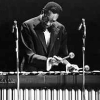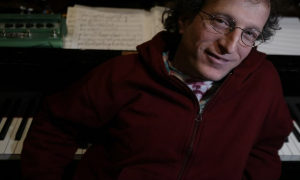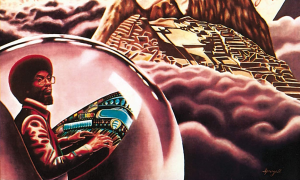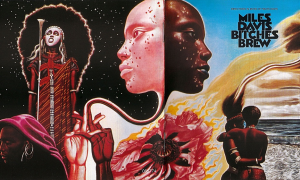Home » Jazz Articles » Rediscovery » Josh Rosen: Beneath the Radar
Josh Rosen: Beneath the Radar
In this era where even small cities all over the country happily boast more and more talented local jazz players, what makes Rosen distinctive is his compositional skill and the way it informs his improvisation and ensemble playing, even in the many free improv sections of the albums reviewed here. "I've composed since the age of 14 —or even younger—and have always improvised," says Rosen on his Berklee web page. "When I sit down at the piano, both those things almost always come out, and they feed each other." Sophisticated harmonies and odd meters mix with singable melodies; he is unafraid of the atonal and unplanned, but not too cool for major triads—whatever will serve the goal of emotional expression.
Rosen and Berklee colleague Stan Strickland (reeds, flute and vocals) have been musical partners for more than a decade and together find the sweet spot where spontaneity and passion meet harmony and order. And when the free improvs suggest the need for elaboration, Rosen and Strickland overdub additional parts after the fact to fill in the songs.
 Josh Rosen
Josh Rosen Three Moments
Ziggle Zaggle Music
2019
Three Moments opens with "Some Other Jungle," a free improv where the players quickly find each other, creating very short structures until Rosen's clusters dissolve into long-held chords suggesting "Giant Steps" (Rosen told me this was an unconscious result of using them in practice). He then begins a left-hand ostinato, creating a bed for Strickland on tenor sax and drummer Bob Moses, shaping one of those "spontaneous compositions" the term that Charles Mingus (an early compositional influence for Rosen) liked to use.
The second track, another free improv featuring Strickland's bass clarinet, gently leads into Rosen's remarkable arrangement of the Civil Rights Movement hymn, "We Shall Overcome." Rosen has reworked the song as a jazz ballad "sung" by Strickland's bass clarinet with a graceful poignance as the song gradually grows in intensity and depth. Rosen's driving piano and Moses' understated yet insistent drums then summon the listener to a tumultuous march.
Rosen's "twelve-ish" is a total rarity, a 12-tone melody made lyrical with jazz harmonies—it is just plain gorgeous. Strickland delivers the melody on tenor sax, Rosen's piano solo is at once dark and sweet, and the trio's simpatico makes it difficult to tell exactly which parts are composed and which are improvised. The other Rosen composition on Three Moments is "Motian"—slow, delicate and full of emotion, inspired by the great drummer and his deliberate yet free approach to rhythm and ensemble playing. Rosen has studied and recorded some of Paul Motian's short compositional sketches together with bassist John Voigt.
 Josh Rosen
Josh Rosen Seasons
Ziggle Zaggle Music
2018
While Three Moments conjures a bit of Don Cherry 's gentle "homemade" free improvs and Motian's small-group approach, Seasons features more of an almost mainstream jazz rhythmic feel. Strickland is there again, and another Berklee colleague, bassist Bruno Raberg is added while Dave Fox plays drums. The album is full of Rosen originals, which is why "mainstream" must be qualified with "almost."
The title track shows the lasting mark of another early influence with vamps and chord changes reminiscent of Keith Jarrett , but Rosen's and Strickland's playing are strictly their own.
Rosen's "Tricycle for Punky" begins as a ballad, jumps into a playful funk and then morphs further. The three wheels—ECM-style, funk and contemporary swing—are kept rolling in the same direction by Rosen's leadership and comping behind Strickland's bass clarinet and soprano sax. Rosen's playing is consistently expressive and imaginative, with clear melodies, unexpected harmonies, a strong sense of swing and flashes of Don Pullen's stormy approach.
"Waltz Eleven" does shuffle in as a jazz waltz, but be careful if you try to dance to it—it drops a beat in the fourth bar to make the meter eleven, while showcasing Rosen's gift for melody and combining unusual chord progressions with major triads. In their solos, both Rosen and Strickland on tenor sax take a vocalist's approach, creating variations around the melody without resort to pattern repetitions.
On Seasons as well as Three Moments, Rosen rearranges a very recognizable song. In this case, The Beatles' "You Never Give Me Your Money" is re-imagined with mixed results. Starting almost as a dirge, it develops nicely into a jazz ballad with Strickland overdubbing vocals under his soprano sax, subtly adding emotional power to the repeated phrase, "break down." Unfortunately, the staccato feel is awkward in the "nowhere to go" section.
Much more convincing is the ghostly beauty of the free improv "Hawthorne" featuring Strickland's flute and vocal—a free improv coherent enough that it sounds at least partially composed.
"Echo Park" provides a fitting end to the album, tying together Rosen's melodic strength, infectious yet shifting rhythms, a vamp to jam on, a slower poignant section, and superb ensemble playing throughout.
Rosen's other recorded works further document his relationship with Strickland and also include the likes of Mick Goodrick , George Garzone and Eugene Friesen. It is a body of work deserving of wider attention.
Tracks and Personnel
Three MomentsTracks: Some Other Jungle; Celestial Bodies; We Shall Overcome; Three Moments; Motian; Three Mo' Moments; twelve-ish; Death Is Not An Ending; We Shall Overcome (Reprise).
Personnel: Josh Rosen: piano; Stan Strickland: voice, woodwinds, percussion; Rakalam Bob Moses: drums, percussion.
Seasons
Tracks: Seasons; TriCycle for Punky; Third Way; Resurgence; Waltz Eleven; You Never Give Me Your Money; Hawthorn; Echo Park.
Personnel: Josh Rosen: piano; Stan Strickland: woodwinds; Bruno Raberg: bass; David Fox: drums.
Tags
Multiple Reviews
Josh Rosen
Steve Plever
Boston
Stan Strickland
Ziggle Zaggle Music
Ra Kalam Bob Moses
Paul Motian
Jon Voigt
Don Cherry
bruno raberg
Dave Fox
Keith Jarrett
Don Pullen
The Beatles
Mick Goodrick
George Garzone
Eugene Friesen
Three Moments =
Seasons
PREVIOUS / NEXT
Support All About Jazz
 All About Jazz has been a pillar of jazz since 1995, championing it as an art form and, more importantly, supporting the musicians who make it. Our enduring commitment has made "AAJ" one of the most culturally important websites of its kind, read by hundreds of thousands of fans, musicians and industry figures every month.
All About Jazz has been a pillar of jazz since 1995, championing it as an art form and, more importantly, supporting the musicians who make it. Our enduring commitment has made "AAJ" one of the most culturally important websites of its kind, read by hundreds of thousands of fans, musicians and industry figures every month.


























